Ethical Dilemma: Case Study of Workplace Harassment and Solutions
VerifiedAdded on 2022/11/03
|7
|2050
|305
Essay
AI Summary
This essay presents an ethical dilemma faced by a female employee experiencing workplace sexual harassment. The author explores the conflict between reporting the harassment, potentially risking her job and the company's reputation, and remaining silent, which would perpetuate the abuse. The essay examines the ethical dilemmas for the individual, colleagues, and the company, considering both deontological and consequentialist ethics. It proposes solutions based on non-consequentialist ethics, emphasizing the importance of individual rights, business ethics, and organizational justice, while also considering the application of Kohlberg's moral development stages. The essay stresses the significance of supporting the employee, adhering to ethical principles, and seeking legal recourse to address the harassment and promote a fair and just workplace environment. The essay also refers to theories like egoism, utilitarianism, and commendable ethics to analyze the situation.
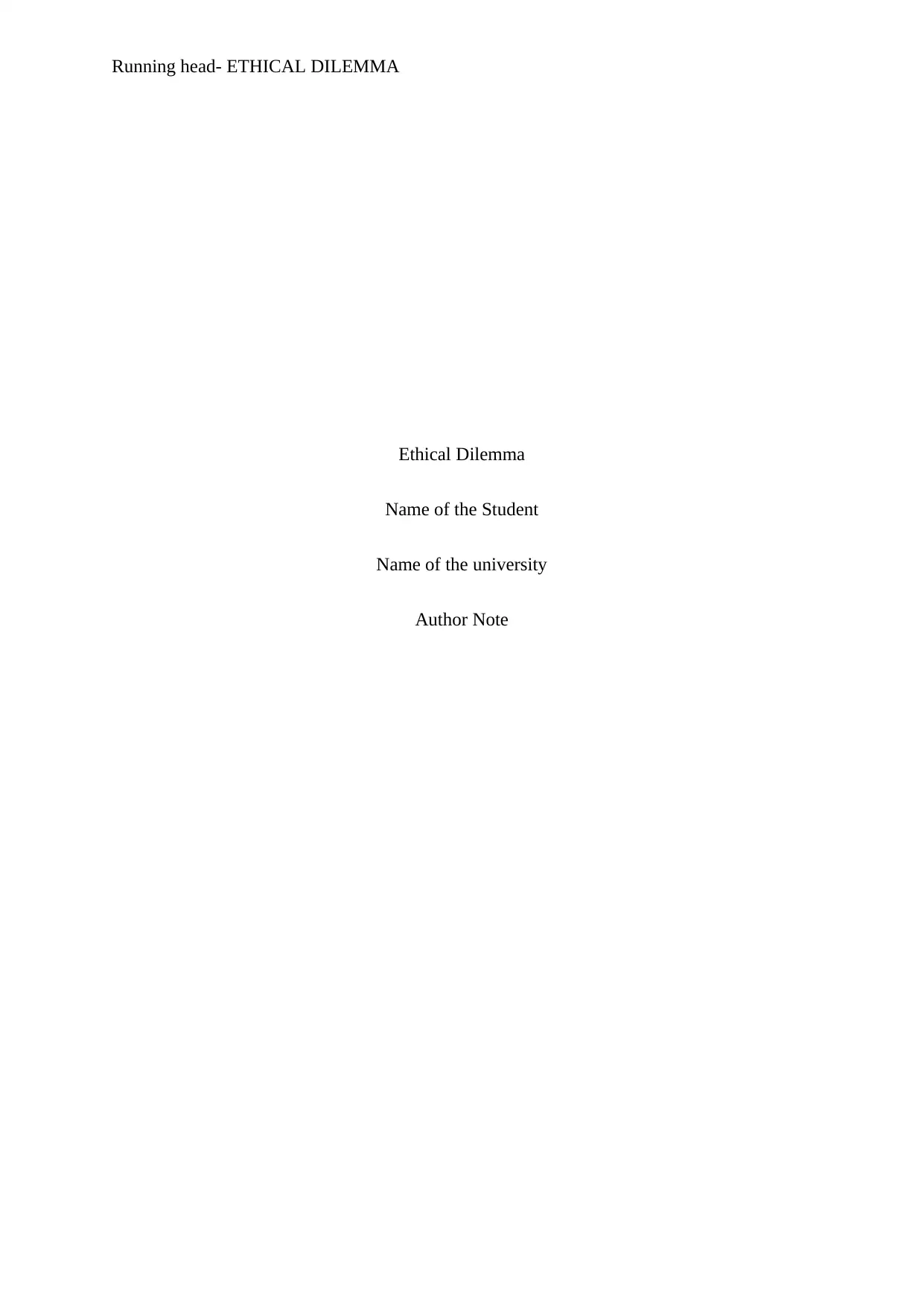
Running head- ETHICAL DILEMMA
Ethical Dilemma
Name of the Student
Name of the university
Author Note
Ethical Dilemma
Name of the Student
Name of the university
Author Note
Paraphrase This Document
Need a fresh take? Get an instant paraphrase of this document with our AI Paraphraser
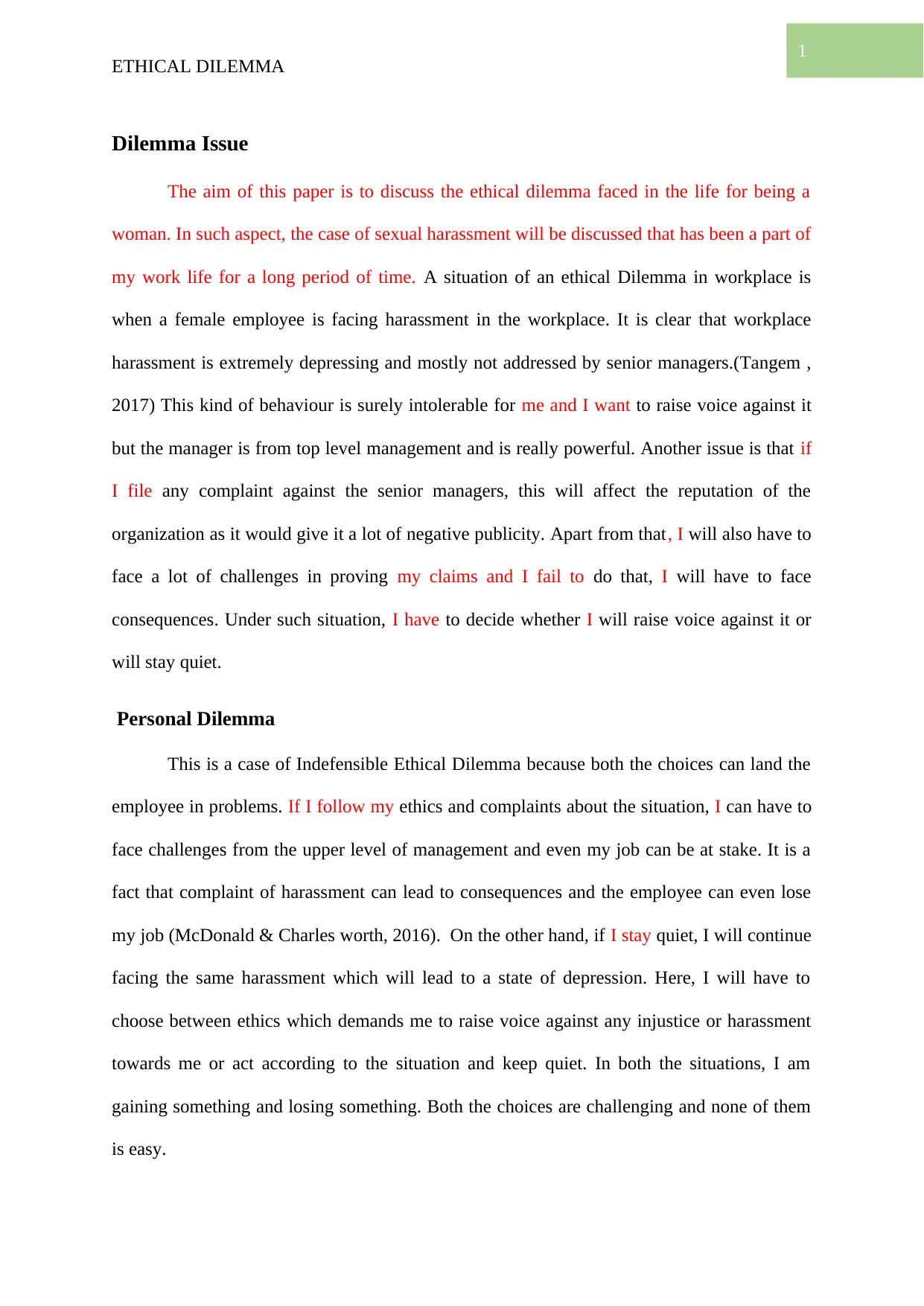
1
ETHICAL DILEMMA
Dilemma Issue
The aim of this paper is to discuss the ethical dilemma faced in the life for being a
woman. In such aspect, the case of sexual harassment will be discussed that has been a part of
my work life for a long period of time. A situation of an ethical Dilemma in workplace is
when a female employee is facing harassment in the workplace. It is clear that workplace
harassment is extremely depressing and mostly not addressed by senior managers.(Tangem ,
2017) This kind of behaviour is surely intolerable for me and I want to raise voice against it
but the manager is from top level management and is really powerful. Another issue is that if
I file any complaint against the senior managers, this will affect the reputation of the
organization as it would give it a lot of negative publicity. Apart from that, I will also have to
face a lot of challenges in proving my claims and I fail to do that, I will have to face
consequences. Under such situation, I have to decide whether I will raise voice against it or
will stay quiet.
Personal Dilemma
This is a case of Indefensible Ethical Dilemma because both the choices can land the
employee in problems. If I follow my ethics and complaints about the situation, I can have to
face challenges from the upper level of management and even my job can be at stake. It is a
fact that complaint of harassment can lead to consequences and the employee can even lose
my job (McDonald & Charles worth, 2016). On the other hand, if I stay quiet, I will continue
facing the same harassment which will lead to a state of depression. Here, I will have to
choose between ethics which demands me to raise voice against any injustice or harassment
towards me or act according to the situation and keep quiet. In both the situations, I am
gaining something and losing something. Both the choices are challenging and none of them
is easy.
ETHICAL DILEMMA
Dilemma Issue
The aim of this paper is to discuss the ethical dilemma faced in the life for being a
woman. In such aspect, the case of sexual harassment will be discussed that has been a part of
my work life for a long period of time. A situation of an ethical Dilemma in workplace is
when a female employee is facing harassment in the workplace. It is clear that workplace
harassment is extremely depressing and mostly not addressed by senior managers.(Tangem ,
2017) This kind of behaviour is surely intolerable for me and I want to raise voice against it
but the manager is from top level management and is really powerful. Another issue is that if
I file any complaint against the senior managers, this will affect the reputation of the
organization as it would give it a lot of negative publicity. Apart from that, I will also have to
face a lot of challenges in proving my claims and I fail to do that, I will have to face
consequences. Under such situation, I have to decide whether I will raise voice against it or
will stay quiet.
Personal Dilemma
This is a case of Indefensible Ethical Dilemma because both the choices can land the
employee in problems. If I follow my ethics and complaints about the situation, I can have to
face challenges from the upper level of management and even my job can be at stake. It is a
fact that complaint of harassment can lead to consequences and the employee can even lose
my job (McDonald & Charles worth, 2016). On the other hand, if I stay quiet, I will continue
facing the same harassment which will lead to a state of depression. Here, I will have to
choose between ethics which demands me to raise voice against any injustice or harassment
towards me or act according to the situation and keep quiet. In both the situations, I am
gaining something and losing something. Both the choices are challenging and none of them
is easy.
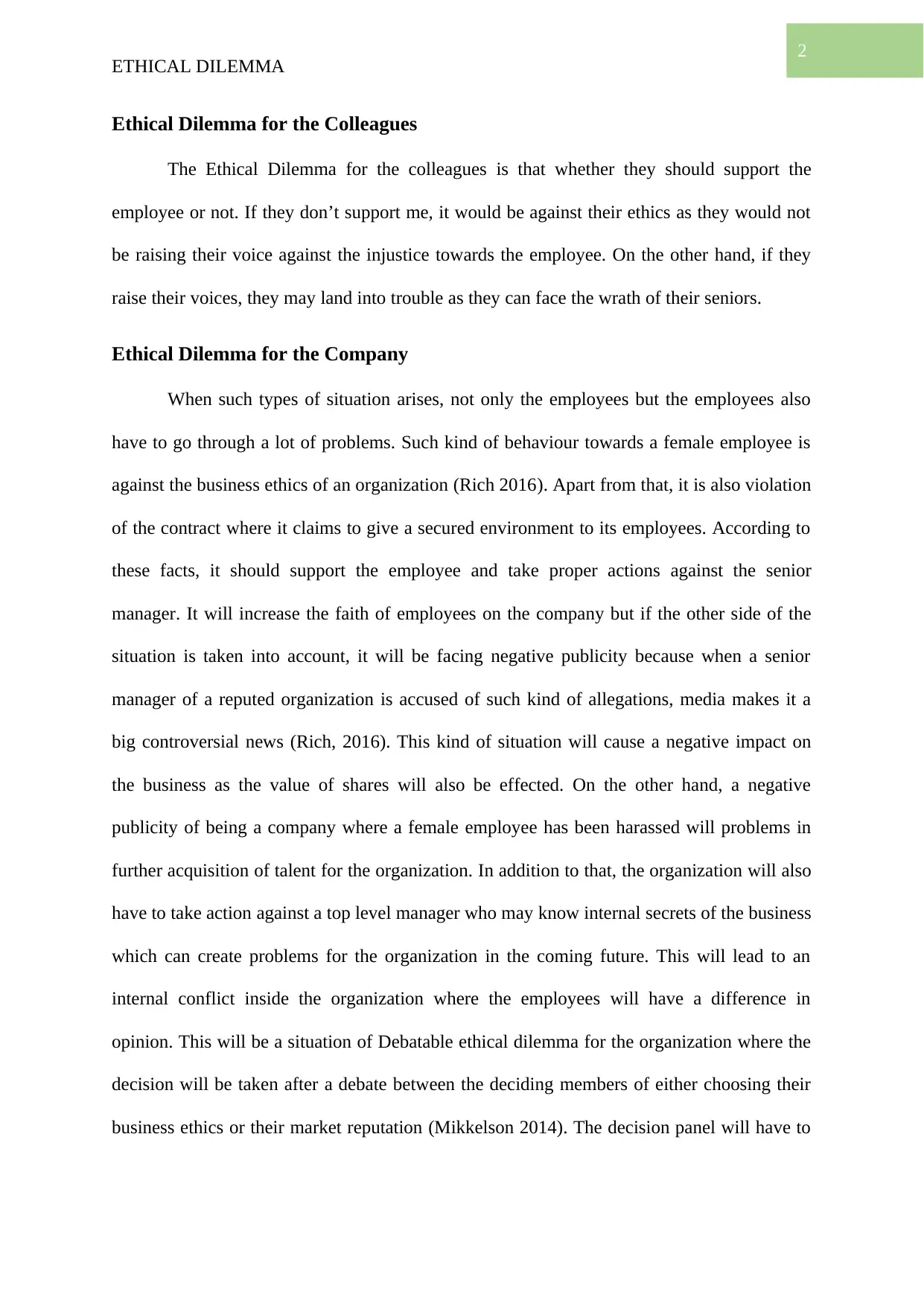
2
ETHICAL DILEMMA
Ethical Dilemma for the Colleagues
The Ethical Dilemma for the colleagues is that whether they should support the
employee or not. If they don’t support me, it would be against their ethics as they would not
be raising their voice against the injustice towards the employee. On the other hand, if they
raise their voices, they may land into trouble as they can face the wrath of their seniors.
Ethical Dilemma for the Company
When such types of situation arises, not only the employees but the employees also
have to go through a lot of problems. Such kind of behaviour towards a female employee is
against the business ethics of an organization (Rich 2016). Apart from that, it is also violation
of the contract where it claims to give a secured environment to its employees. According to
these facts, it should support the employee and take proper actions against the senior
manager. It will increase the faith of employees on the company but if the other side of the
situation is taken into account, it will be facing negative publicity because when a senior
manager of a reputed organization is accused of such kind of allegations, media makes it a
big controversial news (Rich, 2016). This kind of situation will cause a negative impact on
the business as the value of shares will also be effected. On the other hand, a negative
publicity of being a company where a female employee has been harassed will problems in
further acquisition of talent for the organization. In addition to that, the organization will also
have to take action against a top level manager who may know internal secrets of the business
which can create problems for the organization in the coming future. This will lead to an
internal conflict inside the organization where the employees will have a difference in
opinion. This will be a situation of Debatable ethical dilemma for the organization where the
decision will be taken after a debate between the deciding members of either choosing their
business ethics or their market reputation (Mikkelson 2014). The decision panel will have to
ETHICAL DILEMMA
Ethical Dilemma for the Colleagues
The Ethical Dilemma for the colleagues is that whether they should support the
employee or not. If they don’t support me, it would be against their ethics as they would not
be raising their voice against the injustice towards the employee. On the other hand, if they
raise their voices, they may land into trouble as they can face the wrath of their seniors.
Ethical Dilemma for the Company
When such types of situation arises, not only the employees but the employees also
have to go through a lot of problems. Such kind of behaviour towards a female employee is
against the business ethics of an organization (Rich 2016). Apart from that, it is also violation
of the contract where it claims to give a secured environment to its employees. According to
these facts, it should support the employee and take proper actions against the senior
manager. It will increase the faith of employees on the company but if the other side of the
situation is taken into account, it will be facing negative publicity because when a senior
manager of a reputed organization is accused of such kind of allegations, media makes it a
big controversial news (Rich, 2016). This kind of situation will cause a negative impact on
the business as the value of shares will also be effected. On the other hand, a negative
publicity of being a company where a female employee has been harassed will problems in
further acquisition of talent for the organization. In addition to that, the organization will also
have to take action against a top level manager who may know internal secrets of the business
which can create problems for the organization in the coming future. This will lead to an
internal conflict inside the organization where the employees will have a difference in
opinion. This will be a situation of Debatable ethical dilemma for the organization where the
decision will be taken after a debate between the deciding members of either choosing their
business ethics or their market reputation (Mikkelson 2014). The decision panel will have to
⊘ This is a preview!⊘
Do you want full access?
Subscribe today to unlock all pages.

Trusted by 1+ million students worldwide
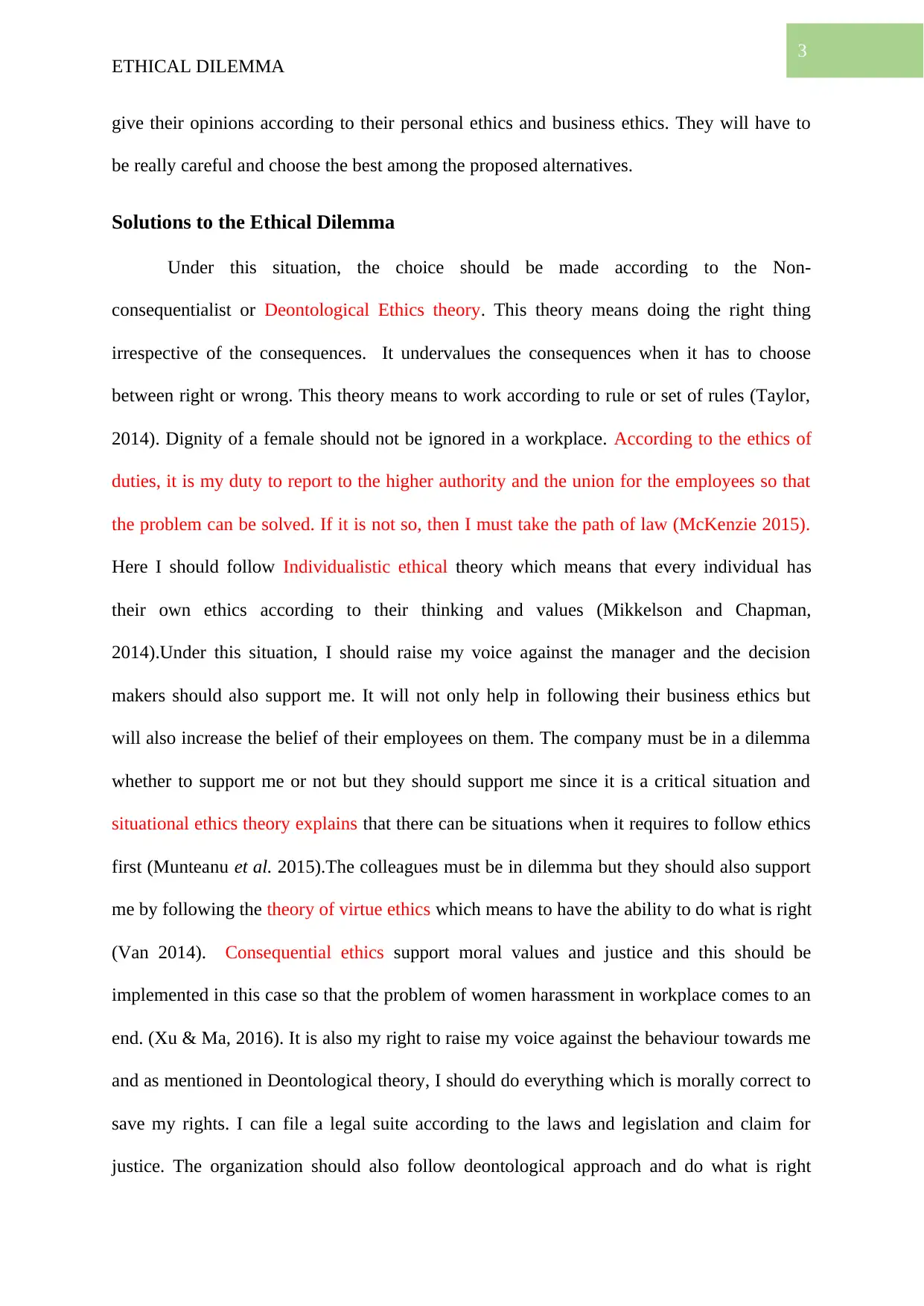
3
ETHICAL DILEMMA
give their opinions according to their personal ethics and business ethics. They will have to
be really careful and choose the best among the proposed alternatives.
Solutions to the Ethical Dilemma
Under this situation, the choice should be made according to the Non-
consequentialist or Deontological Ethics theory. This theory means doing the right thing
irrespective of the consequences. It undervalues the consequences when it has to choose
between right or wrong. This theory means to work according to rule or set of rules (Taylor,
2014). Dignity of a female should not be ignored in a workplace. According to the ethics of
duties, it is my duty to report to the higher authority and the union for the employees so that
the problem can be solved. If it is not so, then I must take the path of law (McKenzie 2015).
Here I should follow Individualistic ethical theory which means that every individual has
their own ethics according to their thinking and values (Mikkelson and Chapman,
2014).Under this situation, I should raise my voice against the manager and the decision
makers should also support me. It will not only help in following their business ethics but
will also increase the belief of their employees on them. The company must be in a dilemma
whether to support me or not but they should support me since it is a critical situation and
situational ethics theory explains that there can be situations when it requires to follow ethics
first (Munteanu et al. 2015).The colleagues must be in dilemma but they should also support
me by following the theory of virtue ethics which means to have the ability to do what is right
(Van 2014). Consequential ethics support moral values and justice and this should be
implemented in this case so that the problem of women harassment in workplace comes to an
end. (Xu & Ma, 2016). It is also my right to raise my voice against the behaviour towards me
and as mentioned in Deontological theory, I should do everything which is morally correct to
save my rights. I can file a legal suite according to the laws and legislation and claim for
justice. The organization should also follow deontological approach and do what is right
ETHICAL DILEMMA
give their opinions according to their personal ethics and business ethics. They will have to
be really careful and choose the best among the proposed alternatives.
Solutions to the Ethical Dilemma
Under this situation, the choice should be made according to the Non-
consequentialist or Deontological Ethics theory. This theory means doing the right thing
irrespective of the consequences. It undervalues the consequences when it has to choose
between right or wrong. This theory means to work according to rule or set of rules (Taylor,
2014). Dignity of a female should not be ignored in a workplace. According to the ethics of
duties, it is my duty to report to the higher authority and the union for the employees so that
the problem can be solved. If it is not so, then I must take the path of law (McKenzie 2015).
Here I should follow Individualistic ethical theory which means that every individual has
their own ethics according to their thinking and values (Mikkelson and Chapman,
2014).Under this situation, I should raise my voice against the manager and the decision
makers should also support me. It will not only help in following their business ethics but
will also increase the belief of their employees on them. The company must be in a dilemma
whether to support me or not but they should support me since it is a critical situation and
situational ethics theory explains that there can be situations when it requires to follow ethics
first (Munteanu et al. 2015).The colleagues must be in dilemma but they should also support
me by following the theory of virtue ethics which means to have the ability to do what is right
(Van 2014). Consequential ethics support moral values and justice and this should be
implemented in this case so that the problem of women harassment in workplace comes to an
end. (Xu & Ma, 2016). It is also my right to raise my voice against the behaviour towards me
and as mentioned in Deontological theory, I should do everything which is morally correct to
save my rights. I can file a legal suite according to the laws and legislation and claim for
justice. The organization should also follow deontological approach and do what is right
Paraphrase This Document
Need a fresh take? Get an instant paraphrase of this document with our AI Paraphraser
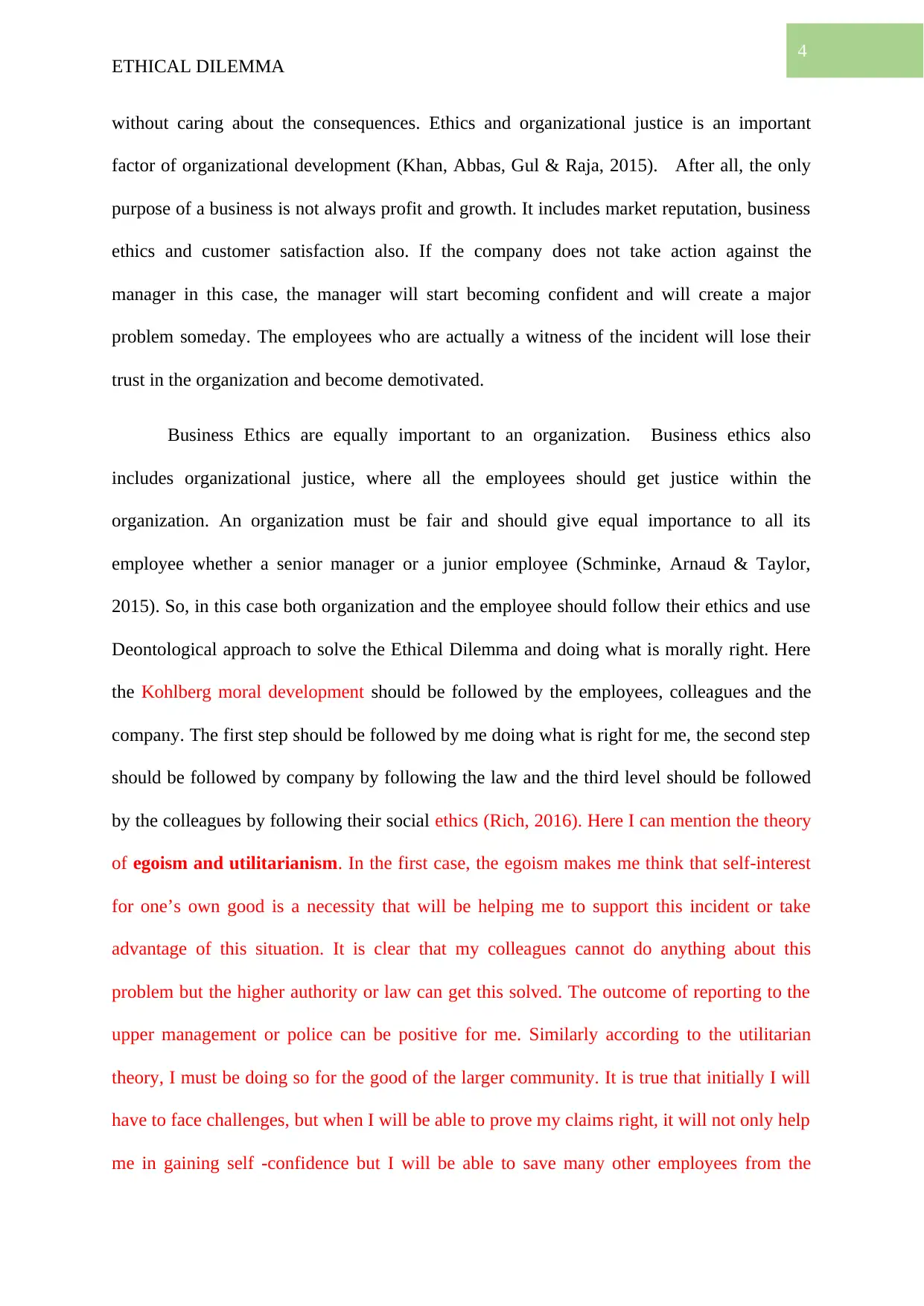
4
ETHICAL DILEMMA
without caring about the consequences. Ethics and organizational justice is an important
factor of organizational development (Khan, Abbas, Gul & Raja, 2015). After all, the only
purpose of a business is not always profit and growth. It includes market reputation, business
ethics and customer satisfaction also. If the company does not take action against the
manager in this case, the manager will start becoming confident and will create a major
problem someday. The employees who are actually a witness of the incident will lose their
trust in the organization and become demotivated.
Business Ethics are equally important to an organization. Business ethics also
includes organizational justice, where all the employees should get justice within the
organization. An organization must be fair and should give equal importance to all its
employee whether a senior manager or a junior employee (Schminke, Arnaud & Taylor,
2015). So, in this case both organization and the employee should follow their ethics and use
Deontological approach to solve the Ethical Dilemma and doing what is morally right. Here
the Kohlberg moral development should be followed by the employees, colleagues and the
company. The first step should be followed by me doing what is right for me, the second step
should be followed by company by following the law and the third level should be followed
by the colleagues by following their social ethics (Rich, 2016). Here I can mention the theory
of egoism and utilitarianism. In the first case, the egoism makes me think that self-interest
for one’s own good is a necessity that will be helping me to support this incident or take
advantage of this situation. It is clear that my colleagues cannot do anything about this
problem but the higher authority or law can get this solved. The outcome of reporting to the
upper management or police can be positive for me. Similarly according to the utilitarian
theory, I must be doing so for the good of the larger community. It is true that initially I will
have to face challenges, but when I will be able to prove my claims right, it will not only help
me in gaining self -confidence but I will be able to save many other employees from the
ETHICAL DILEMMA
without caring about the consequences. Ethics and organizational justice is an important
factor of organizational development (Khan, Abbas, Gul & Raja, 2015). After all, the only
purpose of a business is not always profit and growth. It includes market reputation, business
ethics and customer satisfaction also. If the company does not take action against the
manager in this case, the manager will start becoming confident and will create a major
problem someday. The employees who are actually a witness of the incident will lose their
trust in the organization and become demotivated.
Business Ethics are equally important to an organization. Business ethics also
includes organizational justice, where all the employees should get justice within the
organization. An organization must be fair and should give equal importance to all its
employee whether a senior manager or a junior employee (Schminke, Arnaud & Taylor,
2015). So, in this case both organization and the employee should follow their ethics and use
Deontological approach to solve the Ethical Dilemma and doing what is morally right. Here
the Kohlberg moral development should be followed by the employees, colleagues and the
company. The first step should be followed by me doing what is right for me, the second step
should be followed by company by following the law and the third level should be followed
by the colleagues by following their social ethics (Rich, 2016). Here I can mention the theory
of egoism and utilitarianism. In the first case, the egoism makes me think that self-interest
for one’s own good is a necessity that will be helping me to support this incident or take
advantage of this situation. It is clear that my colleagues cannot do anything about this
problem but the higher authority or law can get this solved. The outcome of reporting to the
upper management or police can be positive for me. Similarly according to the utilitarian
theory, I must be doing so for the good of the larger community. It is true that initially I will
have to face challenges, but when I will be able to prove my claims right, it will not only help
me in gaining self -confidence but I will be able to save many other employees from the
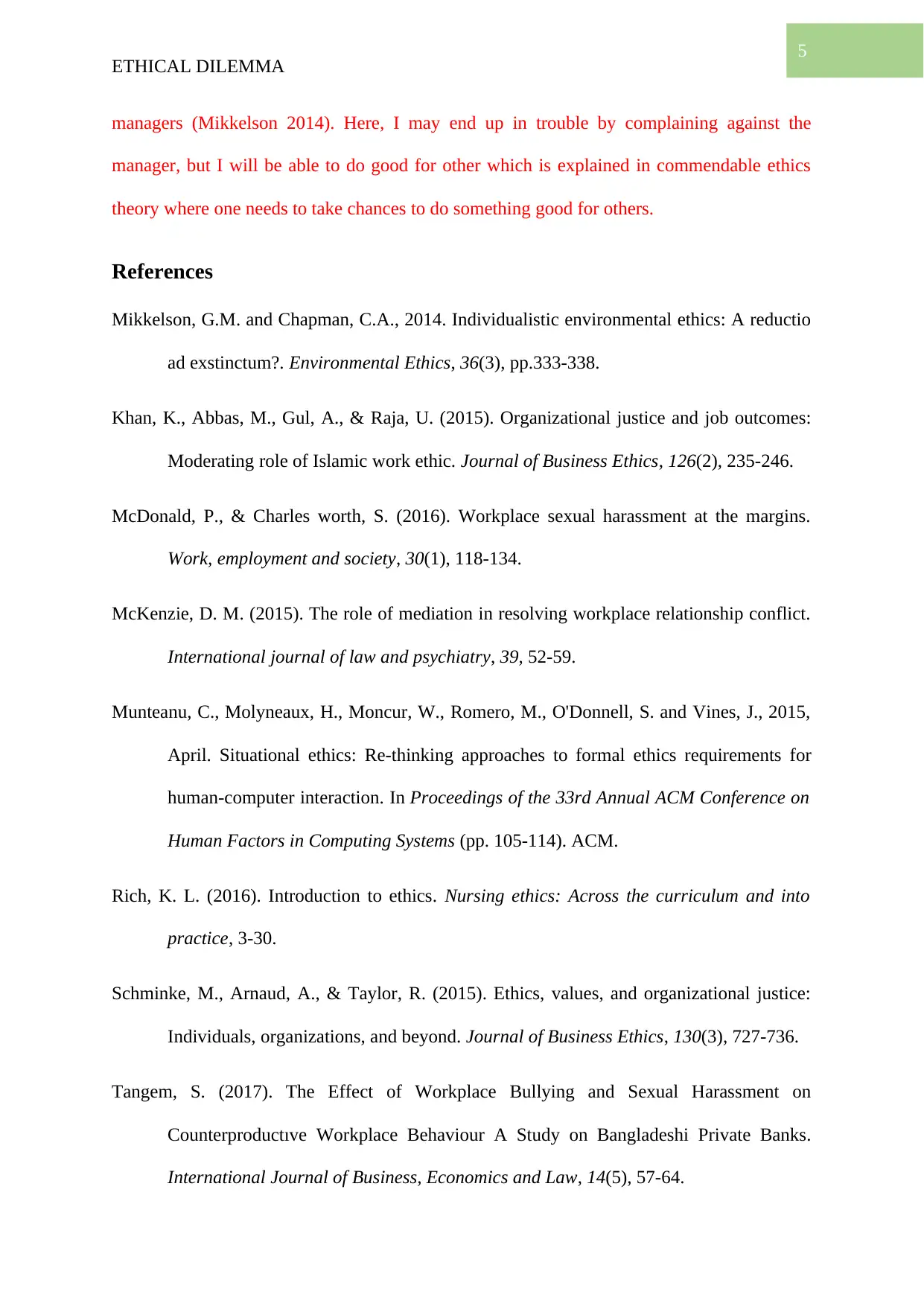
5
ETHICAL DILEMMA
managers (Mikkelson 2014). Here, I may end up in trouble by complaining against the
manager, but I will be able to do good for other which is explained in commendable ethics
theory where one needs to take chances to do something good for others.
References
Mikkelson, G.M. and Chapman, C.A., 2014. Individualistic environmental ethics: A reductio
ad exstinctum?. Environmental Ethics, 36(3), pp.333-338.
Khan, K., Abbas, M., Gul, A., & Raja, U. (2015). Organizational justice and job outcomes:
Moderating role of Islamic work ethic. Journal of Business Ethics, 126(2), 235-246.
McDonald, P., & Charles worth, S. (2016). Workplace sexual harassment at the margins.
Work, employment and society, 30(1), 118-134.
McKenzie, D. M. (2015). The role of mediation in resolving workplace relationship conflict.
International journal of law and psychiatry, 39, 52-59.
Munteanu, C., Molyneaux, H., Moncur, W., Romero, M., O'Donnell, S. and Vines, J., 2015,
April. Situational ethics: Re-thinking approaches to formal ethics requirements for
human-computer interaction. In Proceedings of the 33rd Annual ACM Conference on
Human Factors in Computing Systems (pp. 105-114). ACM.
Rich, K. L. (2016). Introduction to ethics. Nursing ethics: Across the curriculum and into
practice, 3-30.
Schminke, M., Arnaud, A., & Taylor, R. (2015). Ethics, values, and organizational justice:
Individuals, organizations, and beyond. Journal of Business Ethics, 130(3), 727-736.
Tangem, S. (2017). The Effect of Workplace Bullying and Sexual Harassment on
Counterproductıve Workplace Behaviour A Study on Bangladeshi Private Banks.
International Journal of Business, Economics and Law, 14(5), 57-64.
ETHICAL DILEMMA
managers (Mikkelson 2014). Here, I may end up in trouble by complaining against the
manager, but I will be able to do good for other which is explained in commendable ethics
theory where one needs to take chances to do something good for others.
References
Mikkelson, G.M. and Chapman, C.A., 2014. Individualistic environmental ethics: A reductio
ad exstinctum?. Environmental Ethics, 36(3), pp.333-338.
Khan, K., Abbas, M., Gul, A., & Raja, U. (2015). Organizational justice and job outcomes:
Moderating role of Islamic work ethic. Journal of Business Ethics, 126(2), 235-246.
McDonald, P., & Charles worth, S. (2016). Workplace sexual harassment at the margins.
Work, employment and society, 30(1), 118-134.
McKenzie, D. M. (2015). The role of mediation in resolving workplace relationship conflict.
International journal of law and psychiatry, 39, 52-59.
Munteanu, C., Molyneaux, H., Moncur, W., Romero, M., O'Donnell, S. and Vines, J., 2015,
April. Situational ethics: Re-thinking approaches to formal ethics requirements for
human-computer interaction. In Proceedings of the 33rd Annual ACM Conference on
Human Factors in Computing Systems (pp. 105-114). ACM.
Rich, K. L. (2016). Introduction to ethics. Nursing ethics: Across the curriculum and into
practice, 3-30.
Schminke, M., Arnaud, A., & Taylor, R. (2015). Ethics, values, and organizational justice:
Individuals, organizations, and beyond. Journal of Business Ethics, 130(3), 727-736.
Tangem, S. (2017). The Effect of Workplace Bullying and Sexual Harassment on
Counterproductıve Workplace Behaviour A Study on Bangladeshi Private Banks.
International Journal of Business, Economics and Law, 14(5), 57-64.
⊘ This is a preview!⊘
Do you want full access?
Subscribe today to unlock all pages.

Trusted by 1+ million students worldwide
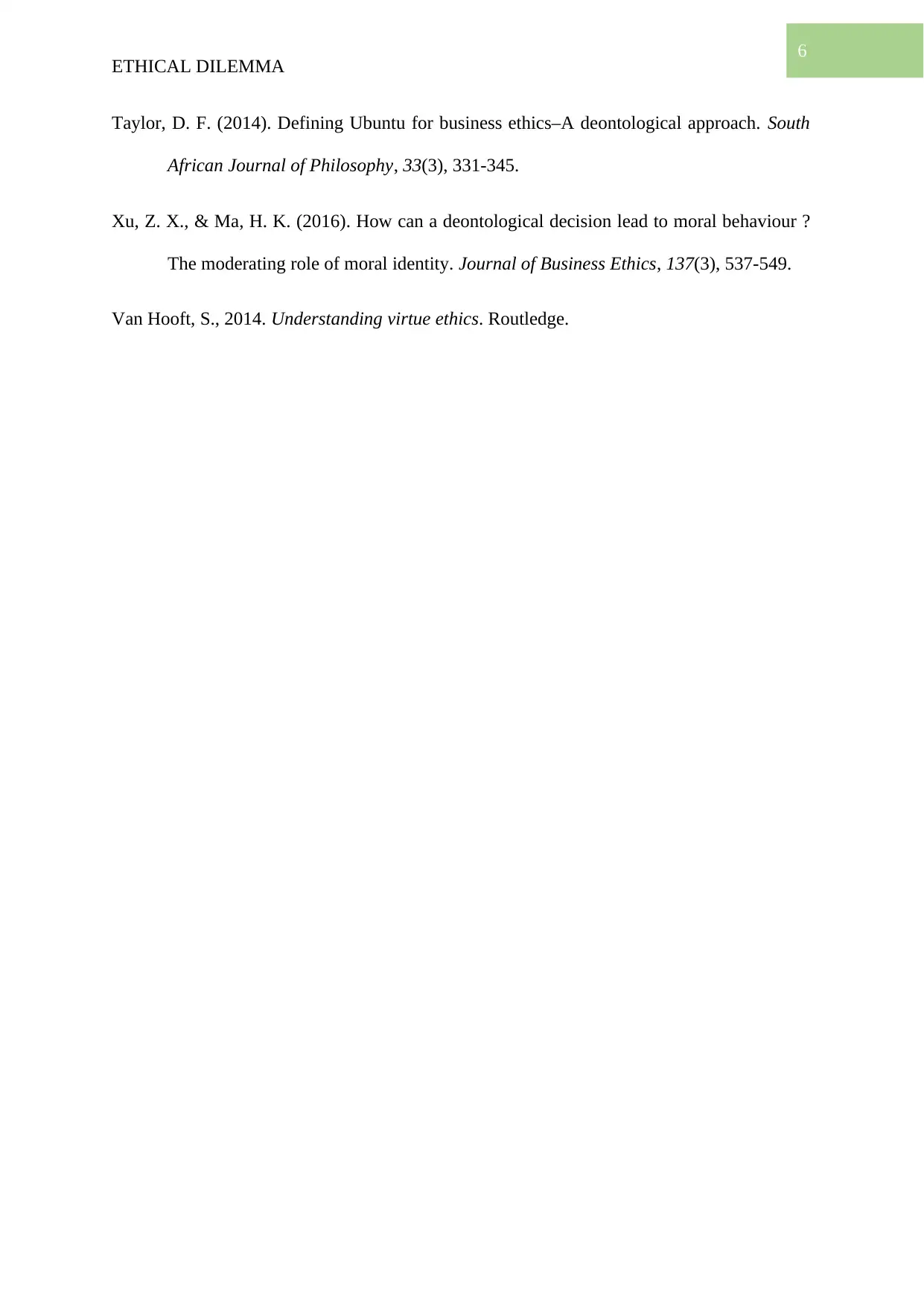
6
ETHICAL DILEMMA
Taylor, D. F. (2014). Defining Ubuntu for business ethics–A deontological approach. South
African Journal of Philosophy, 33(3), 331-345.
Xu, Z. X., & Ma, H. K. (2016). How can a deontological decision lead to moral behaviour ?
The moderating role of moral identity. Journal of Business Ethics, 137(3), 537-549.
Van Hooft, S., 2014. Understanding virtue ethics. Routledge.
ETHICAL DILEMMA
Taylor, D. F. (2014). Defining Ubuntu for business ethics–A deontological approach. South
African Journal of Philosophy, 33(3), 331-345.
Xu, Z. X., & Ma, H. K. (2016). How can a deontological decision lead to moral behaviour ?
The moderating role of moral identity. Journal of Business Ethics, 137(3), 537-549.
Van Hooft, S., 2014. Understanding virtue ethics. Routledge.
1 out of 7
Related Documents
Your All-in-One AI-Powered Toolkit for Academic Success.
+13062052269
info@desklib.com
Available 24*7 on WhatsApp / Email
![[object Object]](/_next/static/media/star-bottom.7253800d.svg)
Unlock your academic potential
Copyright © 2020–2026 A2Z Services. All Rights Reserved. Developed and managed by ZUCOL.




